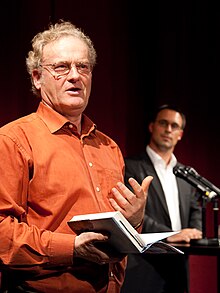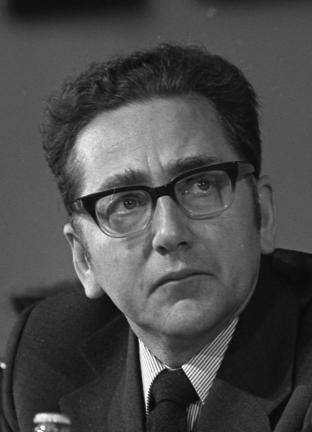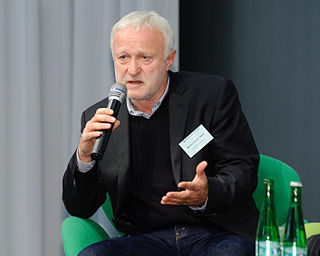
Friedrich Schorlemmer (born 16 May 1944) is a German Protestant theologian. He was a prominent member of the civil rights movement in the German Democratic Republic and has continued to take part in politics after German reunification in 1990.

Friedrich Schorlemmer (born 16 May 1944) is a German Protestant theologian. He was a prominent member of the civil rights movement in the German Democratic Republic and has continued to take part in politics after German reunification in 1990.
Born in Wittenberge on the river Elbe, Friedrich Schorlemmer grew up in the small town of Werben in the region of Altmark, just south of it. The son of a Protestant minister, Schorlemmer was not allowed by the East German authorities to take the exam sat a normal secondary state school, but he passed his at an adult education centre. [1] As a pacifist, he refused to do military service. [2] From 1962 to 1967 he studied theology at Martin-Luther University in Halle. Then, he was a supervisor of studies in a hall of residence and a curate in Halle West. After his ordination in 1970, he worked as a minister in charge of young people and especially students in Merseburg. In 1978, he became a lecturer at the Protestant Preachers' Seminary in Wittenberg and also a preacher at All Saints' Church (Schlosskirche, "Castle Church") there, which is closely associated with Martin Luther and his 95 Theses. Finally, from 1992 until his retirement in December 2007, he was Head of Studies at the Protestant Academy of Saxony-Anhalt in Wittenberg.
Schorlemmer was a member of the Protestant synods of Saxony and of East Germany.
When, in 1968, Alexander Dubček tried to reform communism in Czechoslovakia in the Prague Spring, Schorlemmer and his friends not only sympathized with that development but also spread information about it. [3] In the 1970s and 1980s, he worked for environmental, human rights and peace groups. [4] The department "Political Underground" of the State Security Service ( Stasi ) put him under observation. [5] He was responsible for a symbolical act at the Protestant Church Congress (Kirchentag) in Wittenberg on 24 September 1983, in which a sword was turned into a ploughshare by Stefan Nau, a local blacksmith. [6] [7] The State Security Service did not interfere because the future West German President Richard von Weizsäcker, who was then Mayor of West Berlin, attended the Congress as a representative of the Council of the Protestant Church in Germany, and the Western media reported about it. [8]
In 1988, Schorlemmer's Wittenberg peace group presented twenty theses at the Church Congress in Halle, demanding more freedom. [5]
On 21 August 1989, Schorlemmer was among the founders of a group called Democratic Awakening (Demokratischer Aufbruch) in Dresden. [9] However, when this group had become a political party in December 1989, Wolfgang Schnur (who was later to be found out to have been a collaborator of the Stasi) and Rainer Eppelmann increasingly worked together with the Christian Democratic Union, Schorlemmer and some other members left it. Schorlemmer joined the East German Social Democrats in the beginning of 1989.

The largest mass meeting in the history of the GDR took place on Alexanderplatz (Alexander Square) in East Berlin on 4 November 1989. Many East Germans were no longer willing to accept the dictatorship of the ruling Socialist Unity Party of Germany (SED). It was a dangerous situation, with the possibility of a clash between the demonstrators and armed forces. One of the speakers at the Alexanderplatz demonstration was Schorlemmer. He called for change and a new beginning, but he also pleaded for nonviolence. [5]
After the Berlin Wall had been opened on 9 November 1989, a lot of people left East Germany. Schorlemmer and others published a passionate appeal to stay and build up a new and better kind of society there: Für unser Land ("For our country"). [10] Still, the majority of East Germans supported parties like the CDU in the "Alliance for Germany" (Allianz für Deutschland), which stood for quick re-unification with West Germany. Unification came on 3 October 1990.
Schorlemmer remained politically active. He was leader of the SPD in Wittenberg town council from 1990 to 1994. [2] He is chairman of the Willy Brandt Society (Willy-Brandt-Kreis). [11] He is one of the editors of the journal Der Freitag ("Friday"; a weekly with a daily online edition) and of the monthly Blätter für deutsche und internationale Politik. As a member of the German centre of International PEN, the association of writers, he was among the authors of an open letter in 2004 that asked Muslim intellectuals to protest against international terrorism. [12] He joined the German Commission for UNESCO [13] and the BUND, an organization for the protection of nature and the environment. In 2009, he joined ATTAC, the network of globalization critics. [14] Also, he was one of the founders of the Institut Solidarische Moderne in January 2010. [15]
Schorlemmer spoke out against the wars in Afghanistan in 2001 and Iraq in 2003. [16] [17]
Schorlemmer was awarded the Carl von Ossietsky Medal of the International League for Human Rights in 1989, the Peace Prize of the German Book Trade in 1993, an honorary doctorate by Concordia University in Austin (Texas) in 2002, and the Order of Merit of the Federal Republic of Germany in 2009. [9] [18]
He has published numerous books, essays, speeches and sermons. [19]

Hans-Dietrich Genscher was a German statesman and a member of the liberal Free Democratic Party (FDP), who served as Federal Minister of the Interior from 1969 to 1974, and as Federal Minister for Foreign Affairs and Vice Chancellor of Germany from 1974 to 1992, making him the longest-serving occupant of either post and the only person to have held one of these positions under two different Chancellors of the Federal Republic of Germany. In 1991 he was chairman of the Organization for Security and Co-operation in Europe (OSCE).

Wittenberg, is the fourth largest town in Saxony-Anhalt, Germany. Wittenberg is situated on the River Elbe, 60 kilometers (37 mi) north of Leipzig and 90 kilometers (56 mi) south-west of Berlin, and has a population of 46,008 (2018).

Halle (Saale), or simply Halle (German: [ˈhalə]; from the 15th to the 17th century: Hall in Sachsen; until the beginning of the 20th century: Halle an der Saale[ˈhalə ʔan deːɐ̯ ˈzaːlə](listen); from 1965 to 1995: Halle/Saale) is the largest city of the German state of Saxony-Anhalt, the fifth most populous city in the area of former East Germany after (East) Berlin, Leipzig, Dresden and Chemnitz, as well as the 31st largest city of Germany, and with around 239,000 inhabitants, it is slightly more populous than the state capital of Magdeburg. Together with Leipzig, the largest city of Saxony, Halle forms the polycentric Leipzig-Halle conurbation. Between the two cities, in Schkeuditz, lies Leipzig/Halle International Airport. The Leipzig-Halle conurbation is at the heart of the larger Central German Metropolitan Region.
Articles related to East Germany include:

Egon Karl-Heinz Bahr was a German SPD politician.

Erhard Eppler was a German politician of the Social Democratic Party (SPD) and founder of the Deutsche Gesellschaft für Technische Zusammenarbeit (GTZ). He studied English, German and history in Frankfurt, Bern and Tübingen, achieved a PhD and worked as a teacher. He met Gustav Heinemann in the late 1940s, who became a role model. Eppler was a member of the Bundestag from 1961 to 1976. He was appointed Minister for Economic Cooperation first in 1968 during the grand coalition of Kurt Georg Kiesinger (CDU) and Willy Brandt (SPD), continuing under Chancellor Brandt in 1969 and Chancellor Helmut Schmidt (SPD) in 1974, when he stepped down.
The Handel Prize is an annual award, instituted in 1956, which is presented by the city of Halle, in Germany, in honour of the celebrated Baroque composer George Frideric Handel. It is awarded, "for exceptional artistic, academic or politico-cultural services as far as these are connected with the city of Halle's Handel commemoration". The prize consists of a diploma, a gold and enamel badge, and is presented during the annual Handel Festival, Halle.

The Alexanderplatz demonstration was a demonstration for political reforms and against the government of the German Democratic Republic on Alexanderplatz in East Berlin on Saturday 4 November 1989. With between half a million and a million protesters it was one of the largest demonstrations in East German history and a milestone of the peaceful revolution that led to the fall of the Berlin Wall and German reunification. The demonstration was organized by actors and employees of theaters in East Berlin. It was the first demonstration in East German history that was organized by private individuals and was permitted to take place by the authorities. The speakers during the demonstration were members of the opposition, representatives of the regime and artists, and included the dissidents Marianne Birthler and Jens Reich, the writer Stefan Heym, the actor Ulrich Mühe, the former head of the East German foreign intelligence service Markus Wolf and Politburo member Günter Schabowski.

Sven Giegold is a German politician of the Alliance 90/The Greens who has been serving as State Secretary in the Federal Ministry for Economic Affairs and Climate Action in the coalition government of Chancellor Olaf Scholz since 2021. He was a member of the European Parliament from 2009 to 2021.

Martin Luther University of Halle-Wittenberg, also referred to as MLU, is a public, research-oriented university in the cities of Halle and Wittenberg, and is the largest and oldest university in the German state of Saxony-Anhalt. MLU offers German and international (English) courses leading to academic degrees such as BA, BSc, MA, MSc, doctoral degrees, and Habilitation.

Werner Gustav Schulz was a German politician of Alliance '90/The Greens. Trained in food technology at the Humboldt University of Berlin, he worked as a research assistant. He was an activist for peace ecology and human rights in several oppositional groups from the 1970s. He lost his university job in 1980 when he protested against the Soviet Invasion of Afghanistan. In the Peaceful Revolution, he was in 1989 a founding member of the New Forum, representing the group at the Round Table. He was elected to the first freely elected Volkskammer. After German reunification, he was a member of the German Bundestag from 1990 to 2005, and a member of the European Parliament (MEP) from 2009 to 2014.
Medico International is a human rights organization based in Frankfurt am Main, Germany. Its declared aim is to achieve the human right to health globally. The organization is committed to the global realization of the human right to health. Therefore, the organization supports partner organizations in Africa, Asia and Latin America, who deliver emergency aid in disaster situations and supports long-term projects in the areas of health care, human rights and psychosocial work.
The Internationale Liga für Menschenrechte (Berlin) (ILMR) has awarded the Carl von Ossietzky Medal since 1962. The league has honored personalities, initiatives or organizations who have worked with civil courage and outstanding commitment to the realization of human rights annually since 1962 and at least once every two years from 2011 with the Carl von Ossietzky Medal it donated. The award is named after the German pacifist and Nobel Peace Prize laureate Carl von Ossietzky, who died in 1938 as a result of imprisonment in a concentration camp.
TAKT is a group of writers and composers of new songs for use in Christian churches, initiated in 1947. The genre which the members promoted was later called Neues Geistliches Lied. The name is short for TextAutor/innen- und Komponist/innen-Tagung, a name that the group adopted in 1997.

"Sonne der Gerechtigkeit" is a German Christian hymn with a complex history. The image of a sun of justice or righteousness was created by the prophet Malachi. The text was compiled around 1930 by Otto Riethmüller from older stanzas by different hymnwriters, intended as a wake-up call to the church in a Germany facing the rise of the Nazis. Four of its originally seven stanzas were written in the 18th century, two by Johann Christian Nehring, and two by Christian David. The remaining stanzas were taken from Christian Gottlob Barth, written in the 19th century. An alternative seventh stanza was suggested in 1970, with a strong ecumenical focus. The hymn expresses a call for justice, renewal and unity, within the congregation and church, and among peoples.
Andreas Pečar is a German historian of the Early modern period and a lecturer at the Martin-Luther-University Halle-Wittenberg.
"Einer ist unser Leben" is a poem in five stanzas, written by Lothar Zenetti in 1973. It became a Christian hymn of the genre Neues Geistliches Lied (NGL) with a 1971 melody by Jean Liesse. The song is part of many hymnals, both Catholic and Protestant, and of songbooks, remaining popular in the 21st century.
Günter Fleischhauer was a German musicologist.
Stefan Moses was a German photographer living in Munich.
"Ich lobe meinen Gott, der aus der Tiefe mich holt" is a 1979 Christian hymn with words in German by Hans-Jürgen Netz and a melody by Christoph Lehmann. This Neues Geistliches Lied song has appeared in the German Protestant and Catholic hymnals. It is a preferred song for conventions such as Kirchentag.
{{cite web}}: Missing or empty |title= (help){{cite web}}: Missing or empty |title= (help)